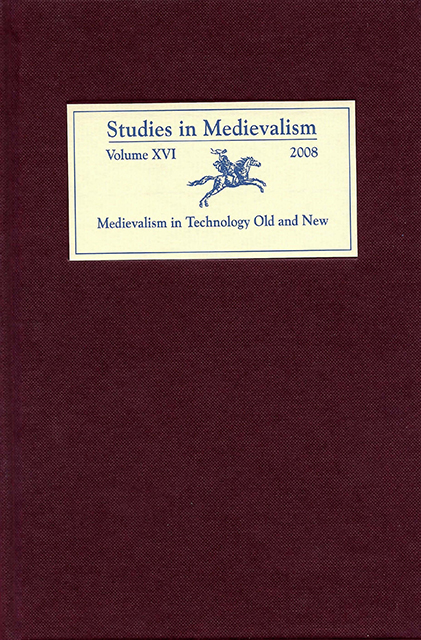Book contents
- Frontmatter
- Studies in Medievalism
- Acknowledgments
- Contents
- Volume XVI 2008
- Illustrations
- Editorial Note
- Contes du Style des Troubadours: The Memory of the Medieval in Seventeenth-Century French Fairy Tales
- A Ritual Failure: The Eglinton Tournament, the Victorian Medieval Revival, and Victorian Ritual Culture
- An Eastern Medieval Revival: Byzantine Art and Nineteenth-Century French Painting
- I Am Weary of That Foolish Tale: Yeatss Revision of Tennysons Idylls and Ideals in Time and the Witch Vivien
- The Doughboy Comes to Chartres: Stars and Stripes and the Middle Ages
- Constructing Difference: The Guidonian Hand and the Musical Space of Historical Others
- An Introduction to Medievalist Video Games
- Medieval and Pseudo-Medieval Elements in Computer Role-Playing Games: Use and Interactivity
- Romancing the Game: Magic, Writing, and the Feminine in Neverwinter Nights
- Revising the Future: The Medieval Self and the Sovereign Ethics of Empire in Star Wars: Knights of the Old Republic
- Promises of Monsters: The Rethinking of Gender in MMORPGs
- Contributors
I Am Weary of That Foolish Tale: Yeatss Revision of Tennysons Idylls and Ideals in Time and the Witch Vivien
Published online by Cambridge University Press: 10 March 2023
- Frontmatter
- Studies in Medievalism
- Acknowledgments
- Contents
- Volume XVI 2008
- Illustrations
- Editorial Note
- Contes du Style des Troubadours: The Memory of the Medieval in Seventeenth-Century French Fairy Tales
- A Ritual Failure: The Eglinton Tournament, the Victorian Medieval Revival, and Victorian Ritual Culture
- An Eastern Medieval Revival: Byzantine Art and Nineteenth-Century French Painting
- I Am Weary of That Foolish Tale: Yeatss Revision of Tennysons Idylls and Ideals in Time and the Witch Vivien
- The Doughboy Comes to Chartres: Stars and Stripes and the Middle Ages
- Constructing Difference: The Guidonian Hand and the Musical Space of Historical Others
- An Introduction to Medievalist Video Games
- Medieval and Pseudo-Medieval Elements in Computer Role-Playing Games: Use and Interactivity
- Romancing the Game: Magic, Writing, and the Feminine in Neverwinter Nights
- Revising the Future: The Medieval Self and the Sovereign Ethics of Empire in Star Wars: Knights of the Old Republic
- Promises of Monsters: The Rethinking of Gender in MMORPGs
- Contributors
Summary
William Butler Yeats's primary contribution to Arthuriana is his early poem “Time and theWitch Vivien” from The Wanderings of Oisin and Other Poems (1889). Yeats's poem explicitly references Tennyson's idyll “Merlin and Vivien” and purports to relate what happened to Vivien after she imprisoned Merlin. The work can thus fairly be said to constitute a sequel to “Merlin and Vivien.” As “Time and the Witch Vivien” opens, the narcissistic Vivien is contemplating her own beauty and her magical powers but is interrupted by a sound upon her threshold: the approach of Father Time. Vivien mistakes Father Time for an elderly peddler and lets him into her chamber. Upon realizing the identity of her visitor, Vivien attempts to obtain his hourglass, the possession of which would literally allow her to stop time. Time refuses to sell the hourglass but wagers it in a game of dice against Vivien. Time defeats Vivien first at dice and then at chess. Immediately upon her second defeat, Vivien dies, having paid the price for playing against Time.
In his quest to construct his identity as a distinctively Irish poet, Yeats from 1895 omitted this explicitly Tennysonian poem from his collected works. Perhaps as a result of this omission, the work has escaped critical attention almost entirely. However, for the original readers of his first book of poems, Yeats's revisionist sequel to Tennyson's “Merlin and Vivien” was one of his central works. Yeats carefully followed the reception of his first book and noted that in the twenty-two reviews of the volume he had read, “Time and the Witch Vivien” was, after the title poem, the work most praised. Yeats's unexpected contribution to the Arthur myth or “Matter of Britain” deserves scholarly study, both as a milestone in his development as an Irish poet and as a fascinating revision of Victorian neo-medievalism. In “Time and the Witch Vivien,” Yeats critiques the British Empire by rewriting its poet laureate. His Vivien is heroic in that she refuses to accept the limitations of mortality, but, entrapped in her own materialist, capitalist paradigm, she is doomed to fail in her quest to defeat Time and seize eternity. Yeats foils Vivien with the more successful Irish questers after eternity, Oisin and the Stolen Child, the subjects of the preceding and subsequent poems in the volume, to make his polemical point that while a materialistic English literature can only die, a spiritual Irish literature might attain eternity.
- Type
- Chapter
- Information
- Studies in Medievalism XVIMedievalism in Technology Old and New, pp. 67 - 82Publisher: Boydell & BrewerPrint publication year: 2008



